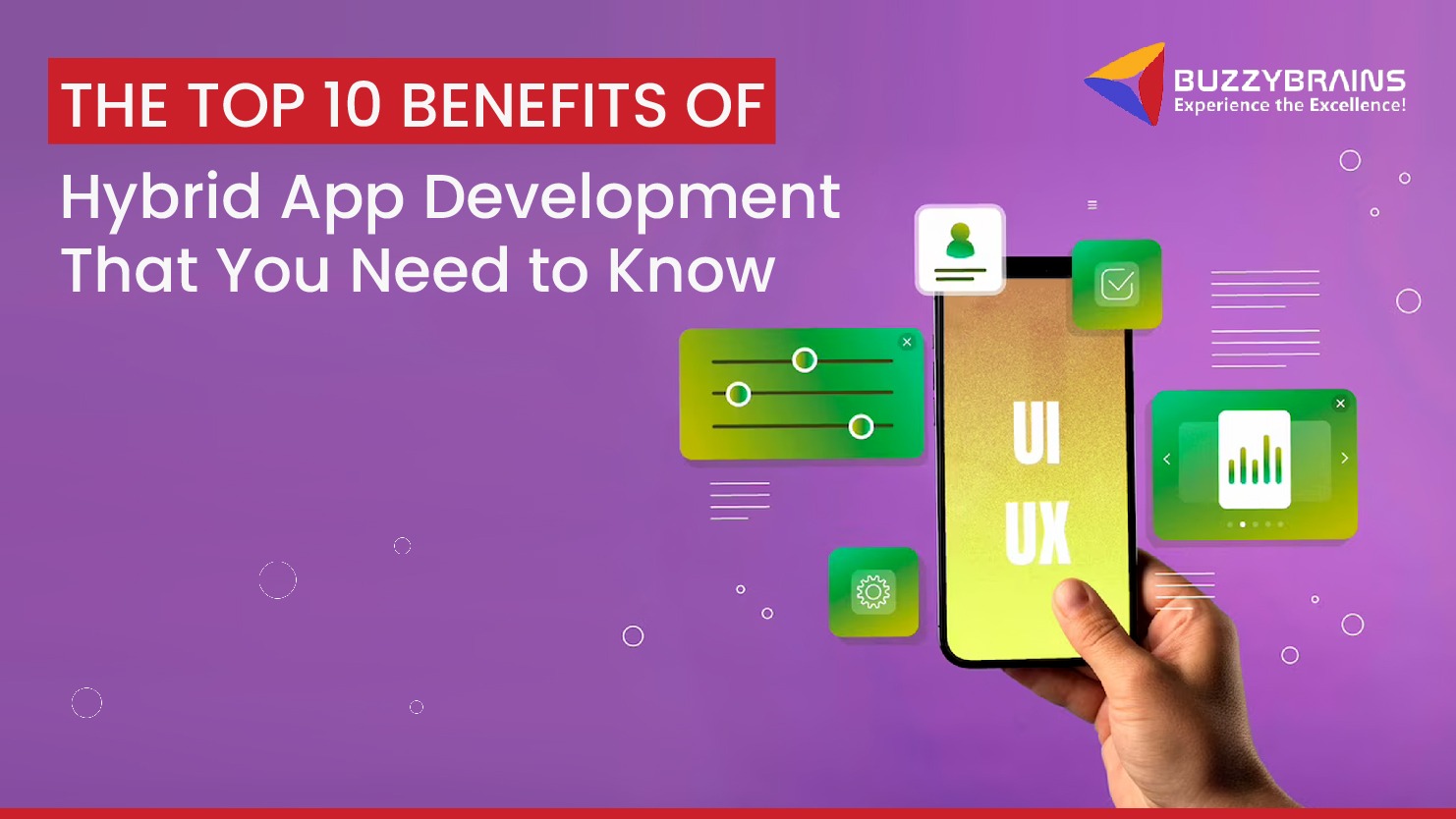The Top 10 Benefits of Hybrid App Development That You Need to Know

- What Are Hybrid Apps?
- What is Hybrid App Development?
- Top 10 Benefits of Hybrid App Development
- Which are the Most Popular Hybrid Mobile App Development Frameworks?
- Key Use Cases of Hybrid Apps
- FAQs About Benefits of Hybrid App Development
- Conclusion
- BuzzyBrains: Your Solution to Expert Mobile App Development
What Are Hybrid Apps?
When we think of app development, our first thought always inclines toward iOS or Android. However, there is a viable third option known as a hybrid app. In simple words, we can understand hybrid apps as software that supports multiple platforms. They combine elements of both native and web applications and are essentially web apps with a native app shell.
Once downloaded and locally installed the shell of hybrid apps connects to whatever capabilities the mobile platform provides through a browser that is embedded in the application. The browser and its plug-ins run on the back end and are invisible to the end user. Hybrid applications are incredibly popular, as they enable developers to write code for a mobile app once and still accommodate it to multiple platforms. According to recent studies, 74 percent of the top 50 retail applications in the App Store are hybrid applications, which include major brands like Amazon, Walmart, Nike, etc.
What is Hybrid App Development?
To simplify, hybrid app development methodology entails building an application using a framework that can target all needed platforms: Android, iOS, Windows, and more. Except for some elements of the application (the primary one being the UI), which users expect to be customized to their platform of choice, developers only need to write the code once for hybrid applications and then it can be reused when developing the application for any other target platform.
Related Blog: Hybrid App Development: All You Need to Know – The Ultimate Guide
Top 10 Benefits of Hybrid App Development
Hybrid app development is beneficial for businesses, especially start-ups, as they can jump on the mobile market bandwagon on all major platforms simultaneously.
Here are the top 10 benefits of hybrid app development.
1. Cross-Platform Compatibility
One of the biggest advantages of hybrid apps is that they run seamlessly across multiple platforms. With a single codebase, businesses can launch apps for both iOS and Android, saving significant development time and effort.
Stat: Developing a hybrid app with a single codebase saves an estimated 30–40% in development costs compared to crafting separate native apps.
Fact: As of 2025, 46% of developers choose Flutter, making it the most popular cross-platform framework, with 28% of new iOS apps now being launched using Flutter.
Example: Companies like Uber and Instagram use hybrid methods to streamline development while ensuring consistent experiences across platforms.
2. Cost-Effective Development
Hybrid app development reduces the need to hire two separate teams for iOS and Android. This single-code approach makes it a budget-friendly solution, especially for startups and SMEs.
Stat: Hybrid development can reduce costs by 25% to 40% compared to building distinct native iOS and Android apps.
Example: The adoption of React Native by businesses such as Instagram enabled shared codebases across platforms, dramatically cutting development and maintenance expenses.
3. Faster Time-to-Market
Since developers don’t need to create two separate versions of the same app, hybrid apps can be developed and deployed much faster. This speed gives businesses a competitive edge, allowing them to launch products quickly.
Stat: Organizations report a 30–35% decrease in time-to-market for hybrid apps versus native development.
Reasoning: Reusing code means you avoid duplicating development efforts per platform, accelerating launches.
Example: Airbnb’s shift to React Native allowed faster iteration and deployment with consistent user experience.
Related Blog: A Detailed Comparison Native Vs Hybrid Mobile App Development: Which One to Choose?
4. Easy Maintenance & Updates
Updating hybrid apps is simple. A change in the code reflects across all platforms, ensuring users always have access to the latest version. This reduces long-term maintenance costs and simplifies app management.
Fact: Central updates in one codebase instantly affect all platforms—no need for separate patches or reviews per app store.
5. Wider Market Reach
Hybrid apps enable businesses to reach users on both iOS and Android platforms simultaneously, without doubling the workload. This broader market reach boosts visibility and customer engagement.
Stat: Businesses using hybrid apps have seen up to a 60% increase in user reach due to simultaneous Android and iOS availability.
6. Offline Functionality
Hybrid apps can store data locally and provide offline support, allowing users to access certain features without an internet connection. This ensures a smooth user experience in areas with limited connectivity.
Fact: Hybrid apps can be designed to support offline usage via local caching and service workers, enhancing reliability in low-connectivity regions.
Example: Twitter’s hybrid Lite app lets users browse Tweets even offline, offering smooth engagement despite connectivity issues
7. Scalability & Flexibility
As your business grows, hybrid apps can easily scale to accommodate new features, integrations, or user demands. Their flexibility makes them ideal for companies planning long-term digital growth.
Fact: Hybrid solutions allow businesses to scale features quickly—add new integrations or expand to more platforms using the same base code.
8. Improved UI/UX Consistency
Hybrid apps ensure a uniform user experience across platforms. From layout to navigation, users get a consistent look and feel, which helps in building trust and loyalty.
Fact: Hybrid frameworks like Flutter and Ionic deliver polished, consistent UIs akin to native apps, with engaging animations and seamless navigation.
Stat: Forbes reports that 37 of the top 50 U.S. retail apps leverage hybrid platforms—highlighting their performance and user satisfaction.
9. Integration with Device Features
Despite being built with web technologies, hybrid apps can still access device features like the camera, GPS, contacts, and push notifications. This makes them perform almost like native apps, delivering an enhanced user experience.
Fact: Hybrid frameworks (e.g., Apache Cordova, React Native) offer access to native device features like GPS, camera, push notifications via plugins.
Example: Gmail—most likely a hybrid app—smoothly integrates notifications and camera features, handling massive user loads with webview components.
10. Future-Proof with Emerging Technologies
Hybrid apps are highly adaptable and can easily integrate with next-gen technologies like Artificial Intelligence (AI), Augmented Reality (AR), and the Internet of Things (IoT). This ensures that your app stays relevant and competitive in the future.
Fact: Hybrid apps built with versatile frameworks (e.g., Flutter, React Native) can integrate upcoming tech—like AI, AR, and IoT—without starting from scratch.
Now that we have touched upon the top 10 benefits of hybrid app development, let us skim through some of its popular frameworks.
Which are the Most Popular Hybrid Mobile App Development Frameworks?
These frameworks enable developers to build applications faster, and more effectively at low costs. Besides, various risks and errors in the job are also reduced.
Some of the most sought-after frameworks for hybrid app development include –
1. React Native
It is an open-source framework created by Facebook to develop apps for Android, Windows, Web, iOS, and more. The features of React Native are –
- It saves money and time
- Better performance
- Enhanced flexibility
- Code reusability
2. Flutter
It is a hybrid framework introduced by Google. Flutter offers an assortment of resources & UI kits so that developers can tailor the app for enhanced speed and performance. The top features of Flutter include –
- The vast scope of creating innovative and stunning user interface
- Faster market time
- Less development time
3. Ionic
It is an open-source framework to develop applications for the platforms like desktop, Android, web, iOS, and more. The features of Ionic include –
- Smooth UI/UX design
- Faster development and testing
- Improved Performance
4. Xamarin
The next framework is Xamarin, which is a free and open-source platform written in C#. The main features of Xamarin include –
- It offers libraries for C++, Java & more.
- Reusable code
- Easy API integration
5. PhoneGap
Last but not least, PhoneGap is another renowned framework for hybrid app development. It is introduced by Adobe Inc, and helps develop mobile apps for Android, Blackberry, iOS, and likewise. The features of PhoneGap include –
- Enhanced UI
- Cost-effective
- Faster development
So, there we have it, a crisp overview of the top five hybrid app development frameworks.
Related Blog: Best Frameworks for Hybrid Mobile App Development: Which One is Right for You?
Key Use Cases of Hybrid Apps
Hybrid app development is an excellent choice for:
- Startups that want to launch quickly with limited budgets.
- Enterprises that need efficient cross-platform solutions.
- Global businesses targeting wider audiences.
Some of the most popular apps you use daily — like Instagram, Uber, Twitter, and Evernote — are powered by hybrid technology.
FAQs About Benefits of Hybrid App Development
Q1. Can hybrid apps perform as well as native apps?
Yes, hybrid apps can perform as well as native apps, offering stellar user experience but at a lower cost. Some of the world’s most popular apps, like Twitter, Amazon, Instagram, etc., are hybrid apps.
Q2. Which programming languages are used in hybrid app development?
The most common programming languages used in hybrid app development are CSS, HTML, and JavaScript.
Q3. Is hybrid app development cost-effective compared to native app development?
Yes, hybrid app development is incredibly cost-effective as they offer cross-platform compatibility. Besides, native app development is the most expensive as you have to build apps for multiple platforms.
Q4. Can a hybrid app be converted to a native app later on?
Yes, it is possible to convert a hybrid app to a native app later on if the binary has the same bundle identifier. You may first release the application with Ionic, Flutter, or another framework and later push a native version of it.
Q5. How does hybrid app development differ from native app development?
The main difference between hybrid app development and native app development is that the former lets the developer write the app functionality in a single codebase, whereas, in native app development, the development team needs to rewrite and redesign all the app functionality in the native development language.
Conclusion
So, there we have it, an extensive overview of the top 10 advantages of hybrid app development. The process serves as a blessing for new businesses dabbling in the mobile market by offering cross-platform compatibility. With benefits like cost-efficiency, faster market time, easy integration, and more, hybrid app development is the future of mobile apps.
BuzzyBrains: Your Solution to Expert Mobile App Development
Ready to take your app to the next level? BuzzyBrains is your go-to partner for exceptional mobile development services. From concept to launch, our team delivers cutting-edge solutions that engage users and drive success. Don’t wait any longer, reach out to us today, and let’s transform your app into a game-changer!
